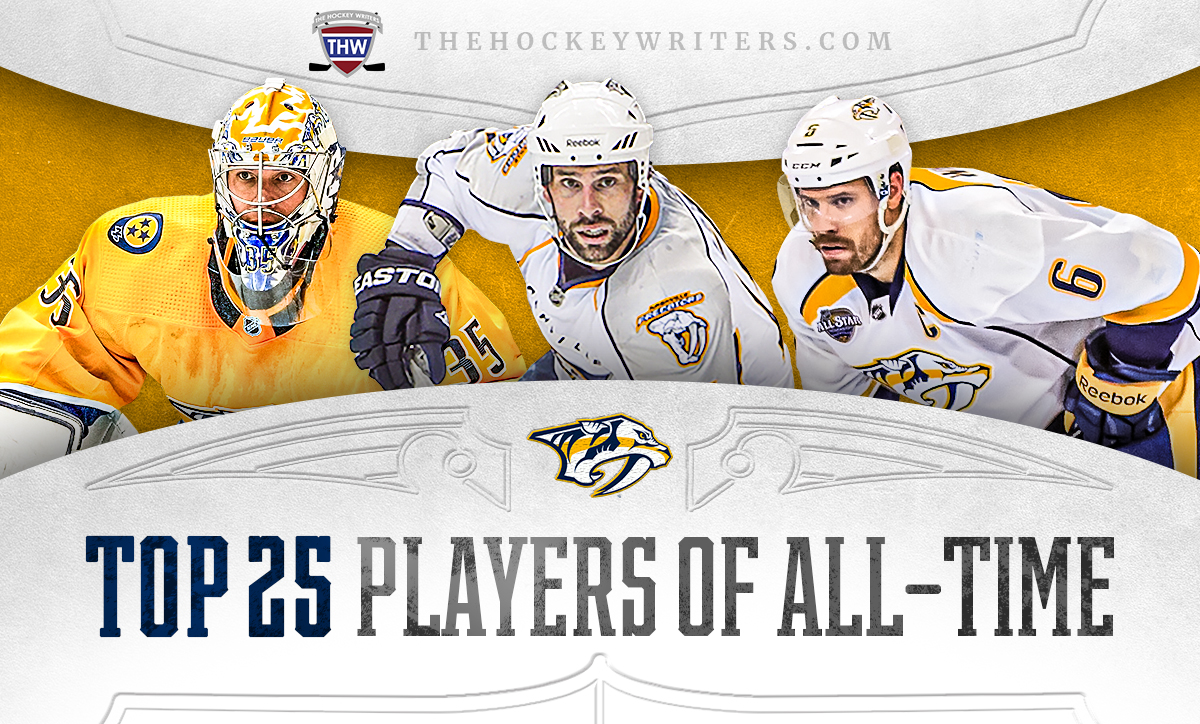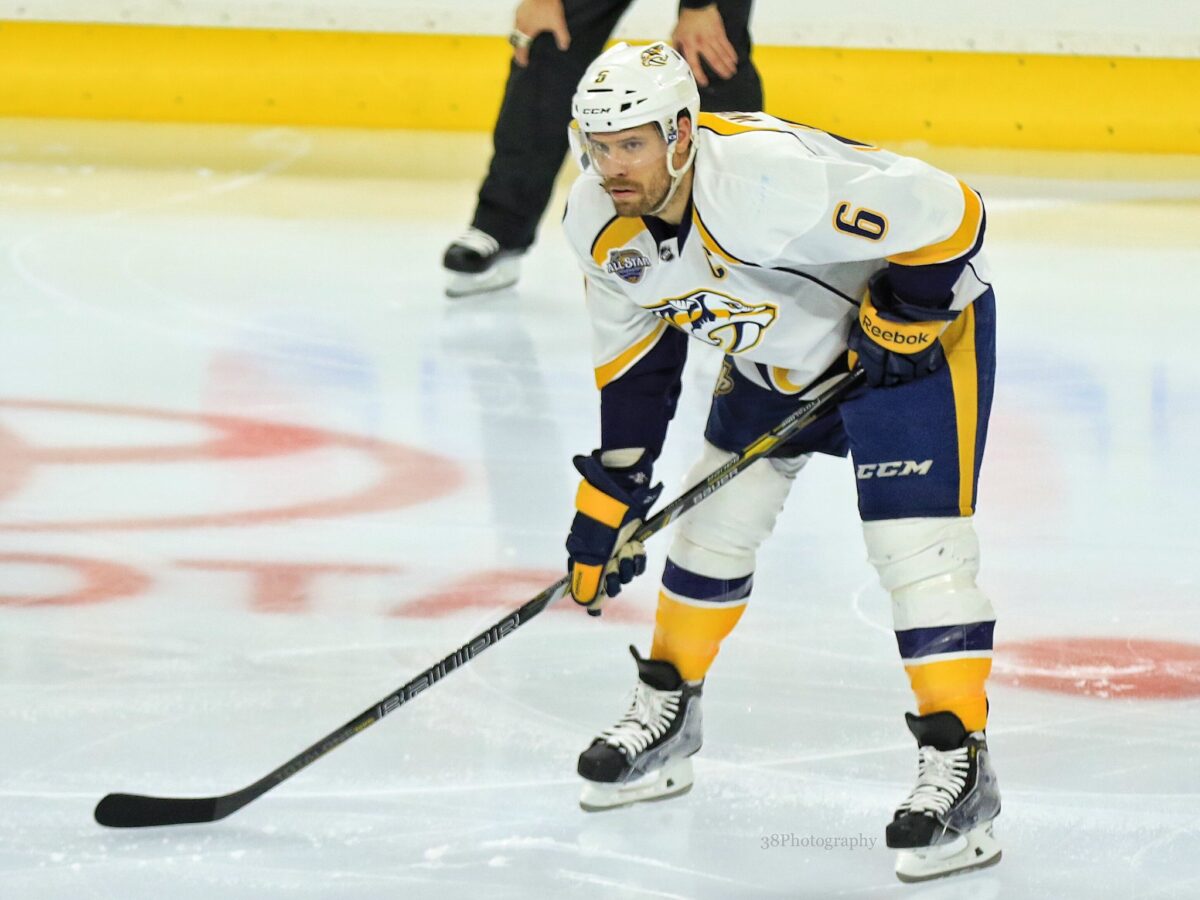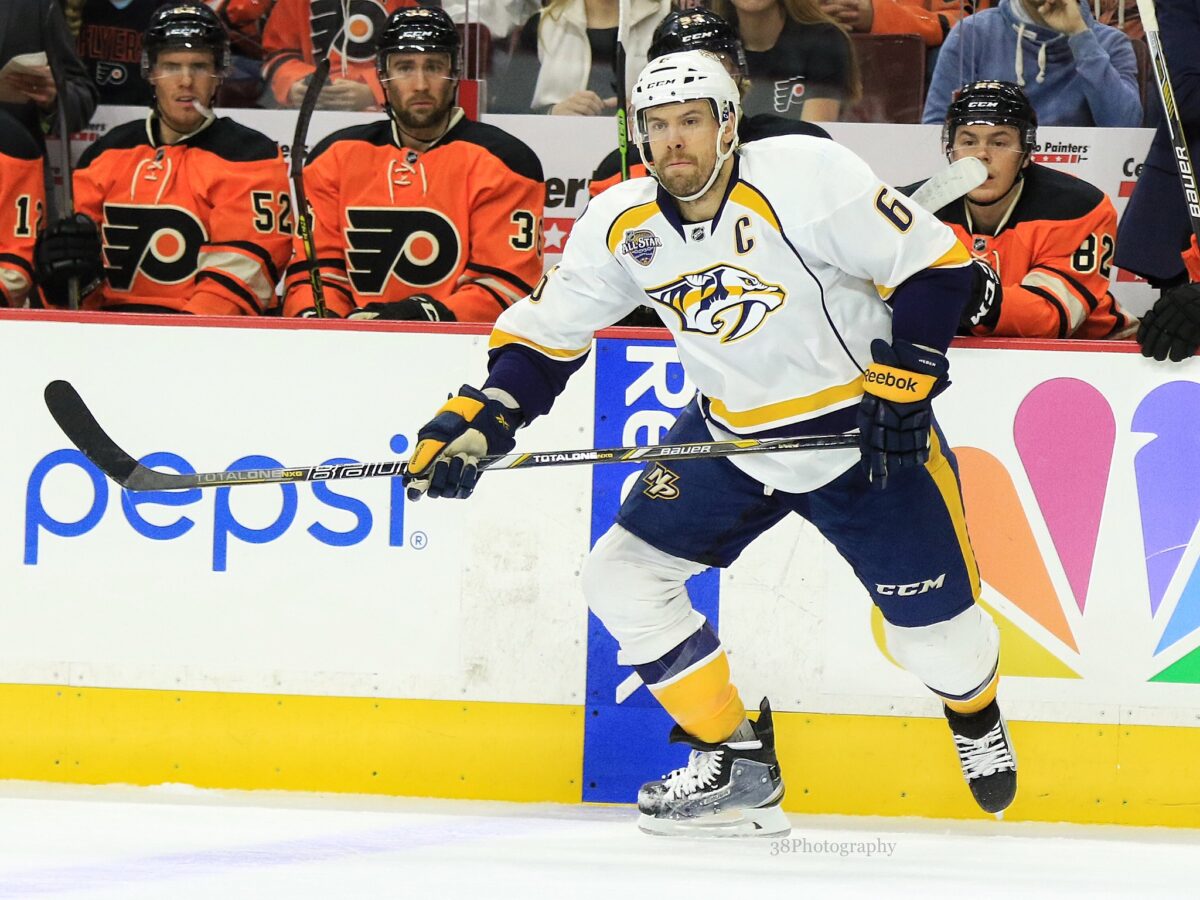Welcome to the Nashville Predators‘ All-Time 25 in 25. In this series, we at The Hockey Writers will unveil the top 25 players in franchise history in honor of the organization’s 25th anniversary. Starting Sept. 18, we will unveil a new player every day until the Predators’ home opener at Bridgestone Arena on Oct. 12. Join us along for the ride as we celebrate 25 years of hockey in Nashville. At three—Shea Weber.

Weber’s Predators Career
During his prime, Weber was one of the most dominant, physically imposing defensemen in the NHL. Standing at 6-foot-4, the right-handed defenseman carried a booming shot, brought a rugged, hard-hitting playstyle, was a leader, and had the offensive talent to run a first-unit power play. The Predators drafted him 49th overall in the 2003 NHL Entry Draft. He played 28 NHL games in the 2005-06 season and became a staple on the Predators’ blue line the following year. He scored 40 points in 79 games in his first full season, earning respect quickly throughout the NHL for his all-around talent.
Weber’s 2008-09 campaign put him within striking distance of winning a Norris Trophy. He finished fourth in voting that year thanks to the 23 goals and 53 points he notched in 81 games. The 23 goals were the first of three seasons he hit the 20-goal mark, the others coming in 2013-14 and 2015-16. Weber showed stout leadership abilities and impeccable defensive and offensive qualities during his first five seasons with the Predators. The Predators named him captain on July 8, 2010, making him the fifth captain in franchise history. In his first season donning the “C” on his jersey, he’d get the closest he’s ever been to winning a Norris Trophy.

Weber scored 16 goals and 48 points in 82 games during the 2010-11 season. He proved that, without a doubt, he was an elite, franchise-altering, number-one defenseman. While his scoring was a slight dip from his 53-point output a couple of seasons prior, the newly-named captain took on the daunting task of manning both the penalty kill and power play. He provided exceptional defense, and his physicality never faltered. Despite his honorable campaign, Weber finished second in Norris Trophy voting with 727 points, just nine behind Nicklas Lidström’s 736.
Weber was a finalist for the Norris Trophy two more times with the Predators, finishing second in voting in 2012 and third in 2014. While the accolade eluded him, he was perennially in the conversation for nearly a decade. He was a five-time All-Star on the Predators, was named to the NHL first All-Star team twice (2011, 2012), and the NHL second All-Star team (2014, 2015) two times as well. He also won the Mark Messier Leadership Award in 2016, recognized for his leadership qualities as the Predators captain. Of course, what is likely the greatest accolade of them all is Weber winning the NHL All-Star hardest shot competition four times in his career, twice as a Predator.

The Predators made the playoffs eight times in Weber’s 11 seasons with the club. They made it out of the first round three times, including his final season with the team. Following their second-round exit in the 2016 NHL Playoffs, the Predators and Montreal Canadiens shocked the hockey world, swapping their Norris calibre defensemen in a one-for-one, earth-shattering deal.
In the Predators record book, Weber is third in games played (763) and goals (166), fourth in assists (277), and fifth in points (443).
Predators Trade Weber in Blockbuster
On June 29, 2016, amid one of the craziest days in NHL history, the Predators traded their right-handed Norris-calibre defenseman to the Canadiens for P.K. Subban, a fellow right-handed Norris-calibre defenseman. The one-for-one trade was a gigantic shakeup between two teams struggling to piece together long postseason runs. Weber, 30 years old at the time, was the booming, relentless defensive stalwart the Canadiens sought after. Subban, 27 at the time, was a smooth-skating, dynamic defenseman who brought immense offensive potential—he wasn’t too shabby defensively, either. The contrasting playstyles each player brought to the table shifted the dynamics of each team’s blue lines.
Ultimately, the trade was a win-win, which is rare for a trade of this magnitude. Both players led their teams to a Stanley Cup Final appearance, with a different Eastern Conference juggernaut sweeping aside both as they repeated as Stanley Cup champions. Weber joined the long list of franchise icons shipped off before they could finish their career as a Predator. Still, they got a player who formed one of the best shutdown pairs in the NHL, helping them reach their first Stanley Cup Final in the organization’s history.
Related: Predators’ Top 25 Players of All-Time: David Legwand
Weber deserves to have his jersey retired and hanging next to Pekka Rinne’s in Bridgestone Arena. It may be a few seasons before the Predators retire any more numbers, but Weber and his former teammate, David Legwand, should be the first two candidates for the honor. His booming slapshot, physical presence, and leadership, paired with his multiple Norris Trophy quality seasons, easily make him the third-best player in Predators history—it’s just a shame he couldn’t finish his career in Nashville.
